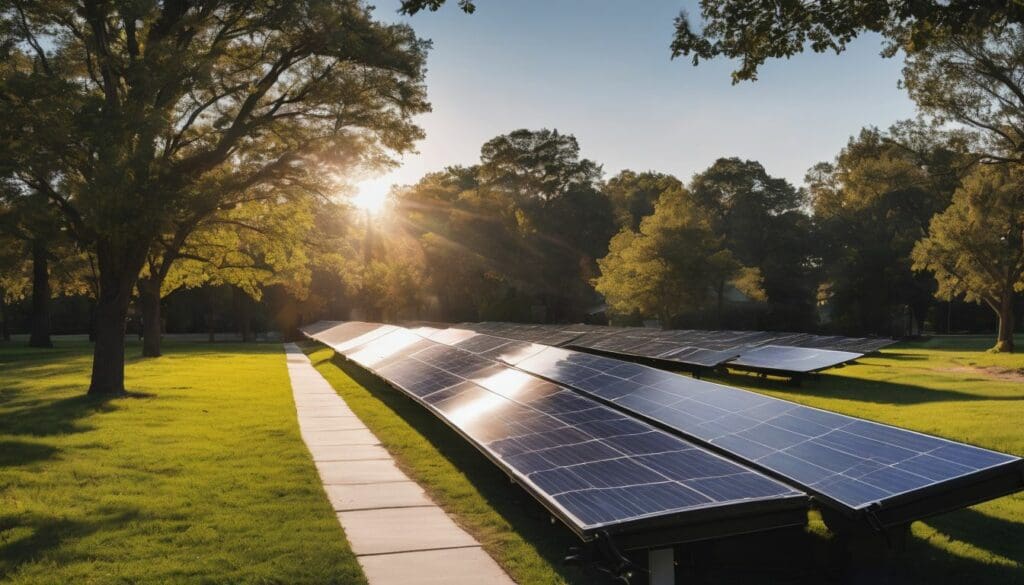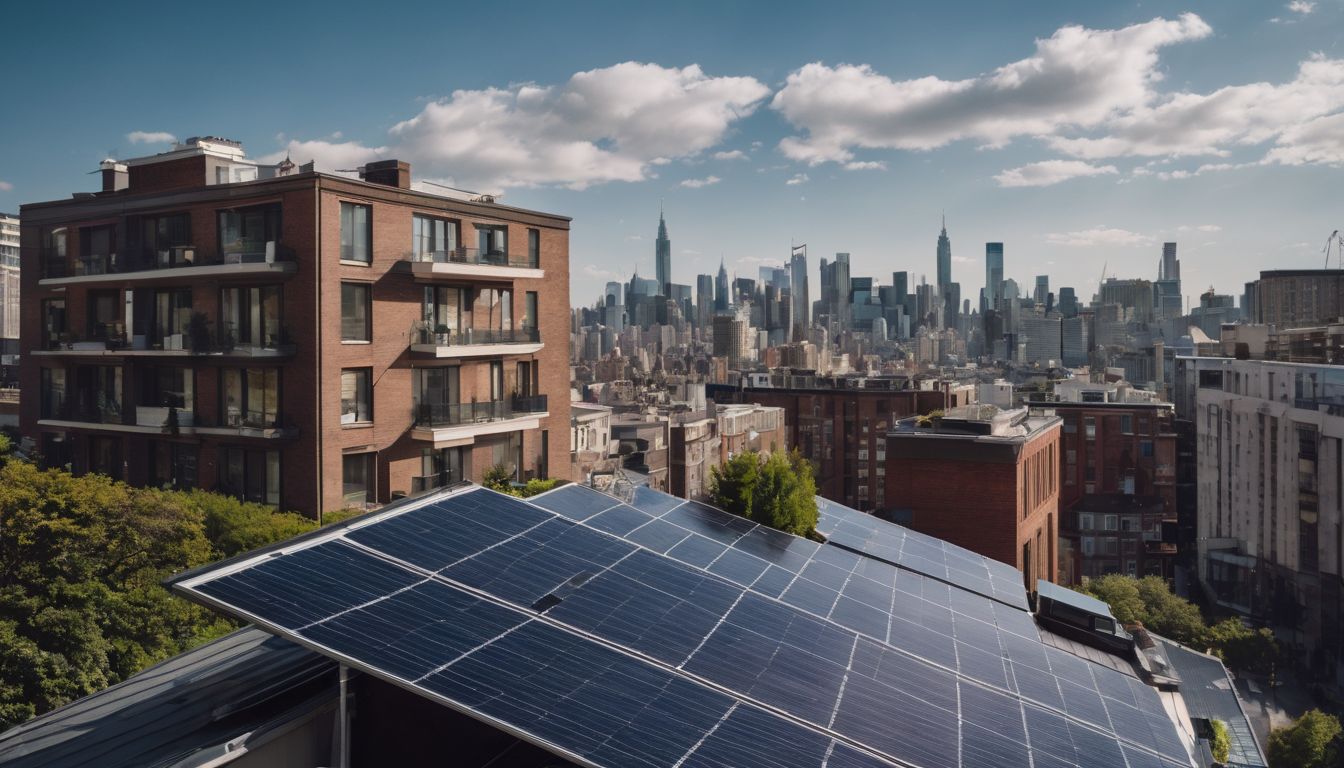Solar energy is booming, but not everyone feels included. Did you know community engagement can make solar projects more successful and accepted? This blog will guide you on how the power of collaboration can transform renewable energy initiatives in your area.
Let’s shine a light together!
Key Takeaways
- Involving the community in solar energy projects from the start ensures their needs are considered, leading to more successful outcomes.
- Educating and actively engaging with communities promotes inclusivity and empowers residents to participate meaningfully in renewable energy decisions.
- Prioritising transparent communication and incorporating public feedback can significantly increase trust and support for solar initiatives, fostering community ownership.
- Solar energy can provide significant financial benefits for households, especially when low-income and underserved groups have access to affordable options.
- Equitable workforce development within solar energy projects opens up diverse employment opportunities, enhancing economic growth at a local level.
Importance of Community Engagement in Solar Energy Projects
Community engagement is crucial in solar energy projects as it connects communities to decision-making and fosters innovation and inclusivity. This involvement ensures that the needs and interests of the community are prioritised, leading to better outcomes for all involved.
Connecting communities to decision-making
Solar energy projects thrive when decision-making includes a diverse range of voices from the community. By involving local residents and stakeholders right from the early planning stages, solar initiatives become more reflective of the community’s needs and values.
This engagement fosters ownership by giving people a say in how renewable energy is integrated into their lives and landscape.
Engaging communities in solar energy decisions ensures that equity and inclusion are at the forefront of development. It allows for innovative solutions to emerge, crafted through collective insights rather than top-down directives.
Involving various groups, especially those historically underserved or marginalised, leads to solar projects that benefit everyone by harnessing local knowledge and prioritising public participation.
Fostering innovation and inclusivity
Fostering innovation and inclusivity in solar energy projects involves creating an environment where diverse ideas thrive and everyone has a voice. Encouraging collaboration between community members, planners, and stakeholders can lead to novel solutions that benefit all involved parties.
By incorporating inclusive practices, such as engaging underserved communities and prioritising equitable workforce development, solar energy projects can enhance innovation while ensuring fairness and accessibility.
Engaging with various stakeholders for input on decision-making processes is crucial for fostering innovative approaches in renewable energy initiatives. This participatory approach not only brings fresh perspectives to the table but also cultivates a sense of belonging within the community, leading to more comprehensive and sustainable solutions for solar power implementation.
Benefits of Community Engagement
Community engagement in solar energy projects brings benefits such as greater household savings, low-income and underserved community access, resiliency and grid benefits, community ownership, and equitable workforce development.
These advantages contribute to the overall success and positive impact of solar energy initiatives within communities.
Greater household savings
Household savings grow with solar energy, reducing electricity bills and providing long-term financial benefits. Solar power lowers dependency on traditional grid-supplied electricity, leading to more predictable and lower monthly costs for households.
Investing in solar panels is a smart financial choice for families looking to save money while contributing to environmental sustainability.
Moving forward, let’s explore the impact of low-income and underserved community access in solar energy projects.
Low-income and underserved community access
Low-income and underserved communities gain increased access to affordable solar energy through community engagement. This involvement empowers these communities by providing opportunities for renewable energy subscriptions, thus reducing their reliance on traditional, often more expensive, energy sources.
Engaging these communities in solar projects also promotes equitable development and ensures that clean energy benefits are accessible to all members of society. By involving low-income and underserved groups in decision-making processes, the entire community can benefit from the savings and resilience offered by solar power.
Resiliency and grid benefits
Communities engaging in solar energy projects benefit from enhanced resiliency and a more stable grid. Solar energy systems help communities become less reliant on traditional power sources, making them more resilient during outages or emergencies.
By diversifying the energy mix, communities can also contribute to improving overall grid stability and reliability. These benefits not only enhance community preparedness but also foster a more sustainable and secure energy future for everyone involved.
Incorporating solar energy into communities leads to increased resiliency throughout the area, strengthening overall sustainability and contributing to a more reliable grid. With fewer disruptions and improved stability, the integration of solar power provides long-term value for both individuals and the wider community by ensuring consistent access to clean, renewable energy sources.
Community ownership
Transitioning from the benefits of resiliency and grid benefits, community ownership plays a pivotal role in ensuring that local communities have a direct stake in solar energy projects.
This involvement empowers households to collectively own and manage solar installations, contributing to greater energy independence and financial savings. By enabling community subscriptions and encouraging equitable workforce development, these initiatives nurture inclusivity and strengthen the fabric of sustainable development.
Ultimately, community ownership fosters a sense of shared responsibility for environmental impact while promoting green technology on a local level.
Equitable workforce development
Creating equitable workforce development in solar energy projects opens doors for diverse employment opportunities, fostering a more inclusive and representative industry. By prioritising training and recruitment from underserved communities, these initiatives can provide meaningful careers for individuals who may have faced barriers to traditional employment paths.
Moreover, focusing on equity in the workforce ensures that the benefits of renewable energy extend beyond just environmental impact, enriching local economies and contributing to social sustainability.
Empowering individuals through access to job opportunities in the solar energy sector is crucial for building resilient communities and addressing economic disparities. Embracing equitable workforce development not only strengthens community engagement but also underlines the commitment to creating a renewable future that is accessible and beneficial for all.
Strategies for Successful Community Engagement
Successful community engagement in solar energy projects involves public education and outreach, incorporating community feedback, and prioritising community interests. It is important to develop best practices for engaging communities in renewable energy initiatives.
Public education and outreach
Educating the public about solar energy is crucial for community engagement. Providing clear and accessible information empowers individuals to understand the benefits of solar energy and actively participate in decision-making.
Outreach initiatives can include workshops, informational materials, and online resources tailored to different demographics, ensuring equitable access to knowledge about renewable energy.
Engaging communities through education fosters informed decisions and promotes inclusivity in solar projects. This approach enables individuals from all backgrounds to contribute meaningfully to the development of sustainable energy solutions within their communities.
Incorporating community feedback
When incorporating community feedback into solar energy projects, it is vital to actively engage with local residents and stakeholders. By seeking input from the community, solar initiatives can better address the specific needs and concerns of the people they are meant to serve.
This inclusive approach fosters a sense of ownership among community members, creating a more sustainable and successful project in the long run.
Prioritising transparency and open dialogue allows for meaningful collaboration between developers and communities, leading to increased trust and support for solar energy initiatives.
Prioritising community interests
After incorporating community feedback, it is essential to prioritise community interests in solar energy projects. This involves actively seeking out and valuing the perspectives of residents, local businesses, and community organisations.
By considering their needs and concerns, solar projects can be tailored to benefit everyone involved.
Prioritising community interests helps ensure that solar energy initiatives are inclusive and equitable. It also fosters a sense of ownership and pride within the community, leading to increased support for renewable energy efforts.
Embedding Solar Energy Projects in the Community
Employing successful strategies for community engagement can result in public learning and involvement, empowering communities through decision-making. By embedding solar energy projects in the community, we can create inclusive and equitable renewable energy initiatives that benefit everyone.
Lessons learned from successful projects
Successful solar energy projects have taught us valuable lessons in community engagement. Engaging communities early on and throughout the project ensures their needs and interests are considered, leading to better outcomes.
Integrating public feedback into project planning and implementation strengthens community buy-in and fosters a sense of shared ownership. By prioritising equitable access, underserved communities can benefit from lower energy costs and improved resiliency.
Empowering communities through decision-making leads to more inclusive and sustainable solar initiatives, creating opportunities for learning and involvement within the public.
Lessons learned from successful projects underscore the importance of transparent communication, genuine collaboration, and meaningful inclusion of diverse voices in every stage of solar energy development.
Opportunities for public learning and involvement
Opportunities for public learning and involvement in solar energy projects are abundant. Community members can participate in workshops, webinars, and information sessions to learn about the benefits of solar energy, how it works, and its potential impact on their community.
By engaging with local organisations and attending public meetings, individuals can gain insight into the decision-making process for solar energy projects happening within their area.
Communities have the chance to voice their opinions on proposed solar initiatives through public consultations and surveys—ensuring that feedback from a diverse range of stakeholders is taken into account during project planning.
Empowering communities through decision-making
Empowering communities through decision-making is crucial for the success of solar energy projects. By involving local residents in the decision-making process, it ensures that their needs and concerns are addressed, leading to more inclusive and impactful initiatives.
This approach fosters a sense of ownership within the community, creating a greater commitment to the project’s success and promoting equitable development in renewable energy.
Through active involvement in decision-making processes, communities can shape how solar energy projects are implemented in their area. This not only empowers residents but also leads to better outcomes that align with their unique needs and aspirations.
Conclusion
In conclusion, community engagement is essential for the success of solar energy projects.
It ensures that diverse voices are heard and valued in decision-making processes.
By prioritising inclusivity and equity, communities can benefit from greater savings, resiliency, and ownership in renewable energy initiatives.
Promoting public involvement and education empowers communities to play an active role in shaping a sustainable future.
FAQs
1. What is community engagement in solar energy projects?
Community engagement in solar energy projects involves connecting communities to decisions about renewable energy initiatives, ensuring their involvement and creating energy-efficient solutions that benefit everyone.
2. Why is it important to involve the community in solar energy projects?
Involving the community ensures that solar projects are inclusive, reflecting local needs and interests, while also empowering residents through public education and outreach for better understanding of renewable energy benefits.
3. How does engaging communities support equity in solar development?
Engaging communities helps promote equity by including underserved populations in discussions and offering them access to solar subscriptions, which supports fair distribution of the advantages from solar energy development.
4. Can community involvement improve the success of a solar project?
Yes! By adopting community solar best practices like thorough outreach and genuine inclusion, we can ensure that renewable energy projects succeed with strong backing from those who stand to gain from their implementation.
5. What are some effective ways to engage people in a new community-based renewable initiative?
Effective engagement might include conducting transparent public meetings about potential impacts, providing clear information on benefits such as job creation or lower electricity costs, and involving local leaders who can facilitate broader participation among residents.





